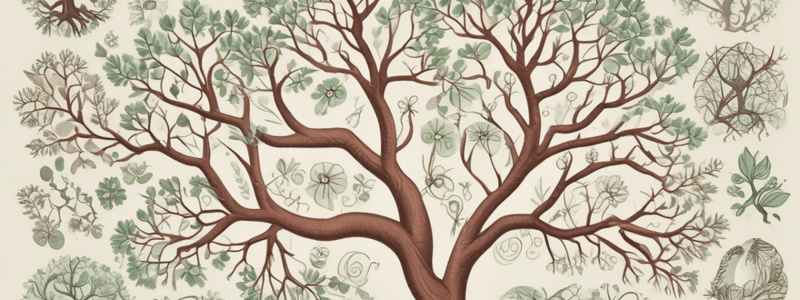Podcast
Questions and Answers
What is the scientific study of life and living organisms?
What is the scientific study of life and living organisms?
- Biology (correct)
- Geology
- Chemistry
- Physics
Which of the following is NOT a branch of biology?
Which of the following is NOT a branch of biology?
- Geology (correct)
- Botany
- Zoology
- Ecology
What is the basic unit of life?
What is the basic unit of life?
- Organ
- Cell (correct)
- Molecule
- Tissue
Who is credited with the laws of inheritance?
Who is credited with the laws of inheritance?
What is the process by which water, carbon dioxide, and light energy are converted into glucose and oxygen?
What is the process by which water, carbon dioxide, and light energy are converted into glucose and oxygen?
What is the study of the relationships between organisms and their environment?
What is the study of the relationships between organisms and their environment?
What is the process by which an organism's genetic information is passed from one generation to the next?
What is the process by which an organism's genetic information is passed from one generation to the next?
What is the study of the diversity of life on Earth?
What is the study of the diversity of life on Earth?
Flashcards are hidden until you start studying
Study Notes
Definition and Scope
- Biology is the scientific study of life and living organisms
- It explores the structure, function, growth, evolution, distribution, and taxonomy of all living things
- Biology is a diverse field that includes various disciplines such as botany, zoology, microbiology, ecology, and biochemistry
Branches of Biology
- Botany: study of plants and their interactions
- Zoology: study of animals and their interactions
- Microbiology: study of microorganisms such as bacteria, viruses, and protists
- Ecology: study of the relationships between organisms and their environment
- Biochemistry: study of the chemical processes that occur within living organisms
- Molecular Biology: study of the structure, function, and interactions of biological molecules
- Genetics: study of heredity, genes, and variation in organisms
- Evolutionary Biology: study of the processes that have shaped the diversity of life on Earth
Cell Biology
- Cells are the basic units of life
- Cell structure: plasma membrane, cytoplasm, nucleus, mitochondria, ribosomes, etc.
- Cell functions: metabolism, growth, division, response to stimuli, etc.
- Cellular processes: photosynthesis, respiration, mitosis, meiosis, etc.
Genetics and Evolution
- Gregor Mendel's laws of inheritance: segregation, independent assortment, dominance, and recessiveness
- DNA structure and replication
- Gene expression and regulation
- Mutation, genetic drift, gene flow, and natural selection
- Speciation and phylogeny
Ecology and Environment
- Ecosystems: interactions between biotic and abiotic factors
- Energy flow: producer, consumer, decomposer
- Nutrient cycles: carbon, nitrogen, oxygen, etc.
- Population dynamics: growth, regulation, and extinction
- Conservation biology: preservation of biodiversity and ecosystem services
Definition and Scope
- Biology is the scientific study of life and living organisms, exploring their structure, function, growth, evolution, distribution, and taxonomy
- It is a diverse field that includes various disciplines such as botany, zoology, microbiology, ecology, and biochemistry
Branches of Biology
- Botany studies plants and their interactions
- Zoology studies animals and their interactions
- Microbiology studies microorganisms such as bacteria, viruses, and protists
- Ecology studies the relationships between organisms and their environment
- Biochemistry studies the chemical processes that occur within living organisms
- Molecular Biology studies the structure, function, and interactions of biological molecules
- Genetics studies heredity, genes, and variation in organisms
- Evolutionary Biology studies the processes that have shaped the diversity of life on Earth
Cell Biology
- Cells are the basic units of life
- Cell structure consists of plasma membrane, cytoplasm, nucleus, mitochondria, ribosomes, etc
- Cell functions include metabolism, growth, division, response to stimuli, etc
- Cellular processes include photosynthesis, respiration, mitosis, meiosis, etc
Genetics and Evolution
- Gregor Mendel's laws of inheritance include segregation, independent assortment, dominance, and recessiveness
- DNA structure is double-helical with sugar-phosphate backbone and nitrogenous bases
- DNA replication occurs through semiconservative replication
- Gene expression involves transcription and translation
- Gene regulation occurs through gene silencing, enhancers, and promoters
- Mutation, genetic drift, gene flow, and natural selection drive evolution
- Speciation occurs through reproductive isolation and phylogeny
Ecology and Environment
- Ecosystems consist of interactions between biotic (living) and abiotic (non-living) factors
- Energy flows through ecosystems from producers to consumers to decomposers
- Nutrient cycles include carbon, nitrogen, oxygen, etc
- Population dynamics involve growth, regulation, and extinction
- Conservation biology aims to preserve biodiversity and ecosystem services
Studying That Suits You
Use AI to generate personalized quizzes and flashcards to suit your learning preferences.



